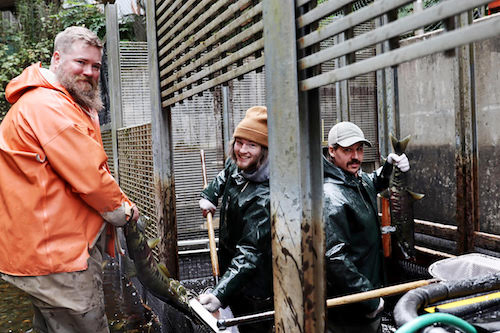How UAS Contributes to the Best Salmon Data in the World
UAS Marine Biology undergraduate students are contributing to the longest running data set on wild Pacific salmon in existence, just steps from the Juneau campus at the National Oceanic and Atmospheric Administration Auke Creek Research Station.
Juneau, Alaska
Date of Press Release: September 13, 2019

UAS Marine Biology undergraduate students are contributing to the longest running data set on wild Pacific salmon in existence, just steps from the Juneau campus at the National Oceanic and Atmospheric Administration Auke Creek Research Station.
Operated with a partnership between the National Marine Fisheries Service, the Department of Fish and Game and the University of Alaska, the site is known to be one of the most detailed and accurate data sets for wild salmon in the world and has become a breeding ground for innovative research that could change how the industry tracks and manages salmon fisheries.
"We have tracked every salmon that comes into this creek for 40 years now. It's been really important to have young, energetic people to collect those so we are able to do more and better sampling, " says Scott Vulstek, a National Marine Fisheries biologist and lead scientist at the Auke Creek Research Station.
Because the opportunity is an unpaid internship, private donations have provided stipends to ensure that the creek has a dedicated staff of students to keep this research going while conducting their own research during a summer-long internship.
"The partnership between NOAA and UAS is really important to us down here at Auke Creek. We don't have the people to staff a place like this. It provides students, who help run the weir and keep up the long-term time series of salmon abundance, productivity, and timing, with a great chance to do research of their own. They gain field skills, lab skills, and experience in computer data analysis." says Vulstek.
When students aren't up to their waists in water, they are in the lab testing samples, extracting DNA, examining fish scales, or running computer generated salmon population projections based on the valuable data they collect.
Joshua Russell came to Juneau from Palmer after graduating high school and was instantly hooked. He earned his bachelor’s degree in Marine Biology at UAS while working at Auke Creek and completed his masters in Fisheries at UAF using Auke Creek data he collected. Seven years later, Russell is now a contract fisheries biologist with NOAA. "This partnership has shaped my career and my entire future," he says.
"One of the main things I would like to accomplish — and this was the focus of my graduate work — is understanding changes in coho salmon marine survival," says Russell. "What is happening in the marine environment? We don't exactly know. I'd like to have a better idea of what is influencing marine survival of these coho salmon using the data I've collected."
UAS Chancellor Rick Caulfield agrees. "The partnership with NOAA over the years has provided student internships, faculty research and collaboration with UAF colleagues. All are unique opportunities for our undergraduate students and a direct contribution to the state’s fishing industry," says Caulfield.
Thirteen UAS undergraduates have worked at the weir under the direction of UAS Professor of Biology Dave Tallmon, Ph.D. Four of those students have earned graduate degrees and one is a post-doc at Cambridge University in the UK. One of the most innovative studies they are currently conducting has allowed researchers to track individual salmon using DNA sampling left behind in salmon slime in filtered water samples collected at the weir.
There is an opportunity to learn more about the research conducted at Auke Creek Fish Weir and the future of salmon in Southeast Alaska on Thursday, September 26 at 7 pm in UAS’ Egan Lecture Hall. Professor Tallmon and student researchers will share findings from 40 years of historical data on the changes to salmon populations collected at the Auke Creek Fish Weir, how that affects our community’s ecology and economy, and will discuss the future of fisheries in Alaska.
Learn more Biology and Marine Biology degree programs, along with other areas of study at UAS or call (907) 796-6100 to speak with an advisor.